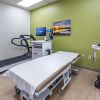How Technology is Shaping the Future of Cardiovascular Health
- The Impact of Technology on Cardiovascular Health
- Revolutionary Diagnostic Tools in Cardiovascular Health
- Personalized Care Through Technology
- Remote Monitoring: Keeping Heart Health in Check
- What the Future Holds for Cardiovascular Health and Technology
1. The Impact of Technology on Cardiovascular Health
Technology has drastically transformed the healthcare sector, especially in the realm of cardiovascular health. Over the past few decades, advancements in medical technology have enabled healthcare providers to diagnose, treat, and manage cardiovascular diseases more effectively. From advanced diagnostic tools to innovative treatments, technology has played a key role in improving heart health outcomes worldwide.
For example, the use of AI and machine learning in analyzing heart-related data has led to more accurate diagnoses. These technologies can identify subtle patterns in ECGs or heart scans that even the most experienced cardiologists might miss. By integrating these technologies, doctors can provide better, faster care to their patients, potentially saving lives.

1.1 The Role of AI in Cardiovascular Care
Artificial intelligence (AI) is making significant strides in cardiovascular health. AI algorithms can now analyze vast amounts of data, from electrocardiograms (ECGs) to heart imaging scans, and predict future cardiac events with remarkable accuracy. This has opened up the possibility for early detection of heart diseases, enabling preventive measures before conditions worsen. For instance, AI is helping doctors predict heart failure by analyzing data such as heart rate variability and blood pressure trends.
Endeavor Health Northwest Community Hospital
endeavor health northwest community hospital
800 W Central Rd, Arlington Heights, IL 60005, USA

2. Revolutionary Diagnostic Tools in Cardiovascular Health
One of the most remarkable impacts of technology in cardiovascular health has been the development of advanced diagnostic tools. These tools allow for more accurate and non-invasive detection of cardiovascular conditions, improving outcomes for patients. Let’s look at some of the most groundbreaking tools in modern cardiology.
2.1 ECG and Wearable Devices
Electrocardiograms (ECGs) have been used for decades to measure heart activity. Today, with wearable devices such as the Apple Watch or Fitbit, individuals can monitor their heart rate and rhythm in real-time. These devices can alert the wearer to irregularities in their heart rate, prompting them to seek immediate medical attention. This wearable tech has empowered individuals to take charge of their own heart health, and it’s been instrumental in catching heart problems early on.
2.2 Cardiac Imaging Innovations
Cardiac imaging technologies like 3D echocardiography, MRI, and CT scans have also evolved significantly. These technologies provide highly detailed images of the heart’s structure and function, enabling cardiologists to detect issues such as blockages, valve diseases, and congenital heart defects. For example, a 3D echocardiogram allows doctors to assess the heart's pumping function with much more precision than traditional 2D scans, leading to better-informed treatment plans.
3. Personalized Care Through Technology
As technology advances, healthcare is becoming increasingly personalized. In the field of cardiovascular health, this means that patients are receiving treatments tailored specifically to their unique genetic makeup, medical history, and lifestyle factors. By leveraging genetic testing, AI-driven algorithms, and health data analytics, cardiologists can now create individualized treatment plans that offer the best outcomes for each patient.
3.1 Genetic Testing and Cardiovascular Health
Genetic testing has become an important tool in cardiovascular medicine. It allows doctors to understand whether a patient is genetically predisposed to certain heart conditions, such as coronary artery disease or arrhythmias. For example, the 23andMe genetic test has been linked to identifying genetic markers for cardiovascular risk, and many cardiologists are now using this data to recommend preventive measures like lifestyle changes or medications.
3.2 Precision Medicine: Tailoring Treatment to the Individual
Precision medicine is a form of treatment where doctors tailor medical care to the individual characteristics of each patient. In the case of cardiovascular diseases, this might involve using data from wearable devices, genetic tests, and patient health records to determine the most effective treatment. Instead of a one-size-fits-all approach, precision medicine ensures that each patient receives the most effective interventions based on their unique health profile.
4. Remote Monitoring: Keeping Heart Health in Check
One of the biggest advancements in cardiovascular health technology has been the rise of remote monitoring. Patients no longer have to visit the hospital or clinic for regular check-ups. Instead, they can monitor their heart health from the comfort of their homes using digital tools and telemedicine platforms. This is particularly beneficial for patients with chronic heart conditions, who need constant monitoring to prevent complications.
4.1 Telemedicine and Virtual Consultations
Telemedicine has revolutionized the way heart patients interact with their doctors. Through video consultations, patients can discuss their symptoms, receive advice, and even follow up on treatment plans without leaving their homes. This technology has been especially crucial during the COVID-19 pandemic, when many people turned to virtual care for safety and convenience. Many cardiologists now offer remote consultations to provide continuous care for their patients.
4.2 Remote Heart Monitoring Devices
Remote heart monitoring devices, such as Holter monitors and smartwatches, have enabled continuous tracking of a patient's heart rhythm and overall cardiovascular health. These devices can detect abnormalities, such as irregular heartbeats, and send alerts to both the patient and their healthcare provider. For example, the Apple Watch includes an ECG feature that can detect signs of atrial fibrillation, allowing for early intervention before the condition becomes life-threatening.
5. What the Future Holds for Cardiovascular Health and Technology
The future of cardiovascular health and technology looks incredibly promising. With advancements in AI, data analytics, and remote care, patients will continue to receive more accurate, personalized, and accessible care. There is also the exciting potential for the development of bioengineered organs, such as lab-grown hearts, which could help millions of patients in the future. However, as technology evolves, so will the need for responsible integration and continuous monitoring to ensure patient safety and privacy.
5.1 AI-Driven Predictive Analytics
In the near future, AI-driven predictive analytics will play an even bigger role in heart disease prevention. By analyzing vast amounts of health data, AI can predict cardiovascular events before they happen, allowing for even more proactive treatment. This could significantly reduce the number of heart-related emergencies and improve overall cardiovascular health outcomes.
5.2 The Role of Biotechnology in Heart Disease Treatment
Biotechnology is another field that holds great promise for cardiovascular health. Research into gene therapies and regenerative medicine could provide breakthroughs in heart disease treatments. In the future, we may see patients receiving gene-based treatments to correct genetic defects that lead to heart disease or even the use of stem cells to regenerate damaged heart tissue.
Technology’s role in cardiovascular health is continually evolving, and as these advancements continue, the possibilities for improving heart health are endless. If you're interested in learning more about how technology can improve your cardiovascular health, or you're looking for the best heart disease checkup specialists, visit our platform for expert recommendations and services.





















Capital Health Medical Center – Hopewell
capital health medical center hopewell
1 Capital Way, Pennington, NJ 08534, USA